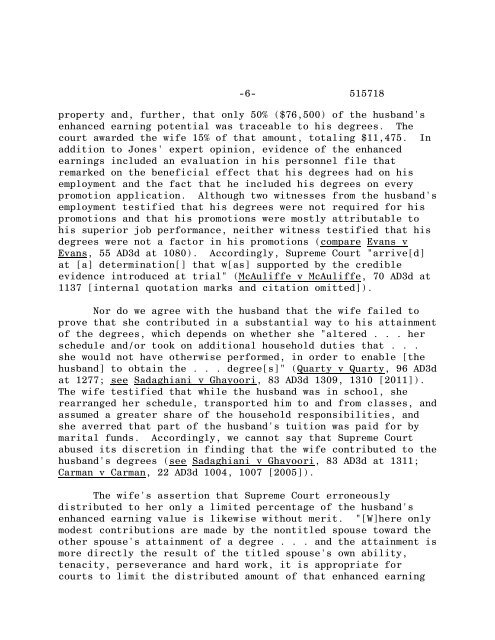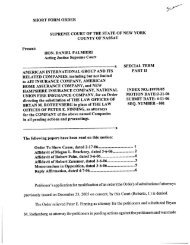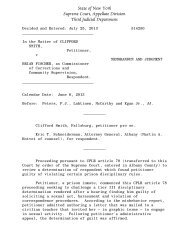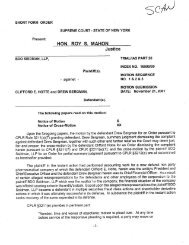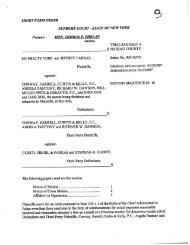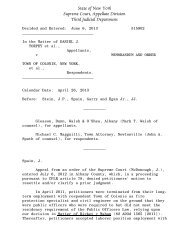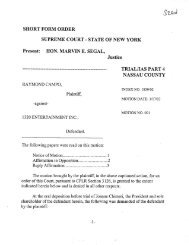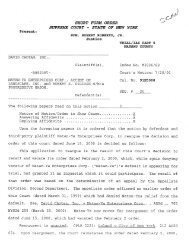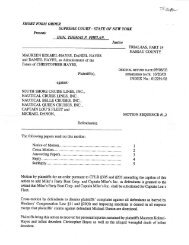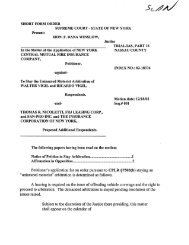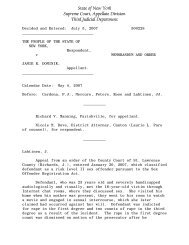515718 McCaffrey v McCaffrey
515718 McCaffrey v McCaffrey
515718 McCaffrey v McCaffrey
Create successful ePaper yourself
Turn your PDF publications into a flip-book with our unique Google optimized e-Paper software.
-6- <strong>515718</strong><br />
property and, further, that only 50% ($76,500) of the husband's<br />
enhanced earning potential was traceable to his degrees. The<br />
court awarded the wife 15% of that amount, totaling $11,475. In<br />
addition to Jones' expert opinion, evidence of the enhanced<br />
earnings included an evaluation in his personnel file that<br />
remarked on the beneficial effect that his degrees had on his<br />
employment and the fact that he included his degrees on every<br />
promotion application. Although two witnesses from the husband's<br />
employment testified that his degrees were not required for his<br />
promotions and that his promotions were mostly attributable to<br />
his superior job performance, neither witness testified that his<br />
degrees were not a factor in his promotions (compare Evans v<br />
Evans, 55 AD3d at 1080). Accordingly, Supreme Court "arrive[d]<br />
at [a] determination[] that w[as] supported by the credible<br />
evidence introduced at trial" (McAuliffe v McAuliffe, 70 AD3d at<br />
1137 [internal quotation marks and citation omitted]).<br />
Nor do we agree with the husband that the wife failed to<br />
prove that she contributed in a substantial way to his attainment<br />
of the degrees, which depends on whether she "altered . . . her<br />
schedule and/or took on additional household duties that . . .<br />
she would not have otherwise performed, in order to enable [the<br />
husband] to obtain the . . . degree[s]" (Quarty v Quarty, 96 AD3d<br />
at 1277; see Sadaghiani v Ghayoori, 83 AD3d 1309, 1310 [2011]).<br />
The wife testified that while the husband was in school, she<br />
rearranged her schedule, transported him to and from classes, and<br />
assumed a greater share of the household responsibilities, and<br />
she averred that part of the husband's tuition was paid for by<br />
marital funds. Accordingly, we cannot say that Supreme Court<br />
abused its discretion in finding that the wife contributed to the<br />
husband's degrees (see Sadaghiani v Ghayoori, 83 AD3d at 1311;<br />
Carman v Carman, 22 AD3d 1004, 1007 [2005]).<br />
The wife's assertion that Supreme Court erroneously<br />
distributed to her only a limited percentage of the husband's<br />
enhanced earning value is likewise without merit. "[W]here only<br />
modest contributions are made by the nontitled spouse toward the<br />
other spouse's attainment of a degree . . . and the attainment is<br />
more directly the result of the titled spouse's own ability,<br />
tenacity, perseverance and hard work, it is appropriate for<br />
courts to limit the distributed amount of that enhanced earning


